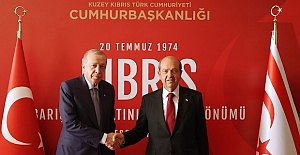Israeli Prime Minister Benjamin Netanyahu has listed conditions to accept a U.S. back-channel peace plan known as "deal of the century", in a move seen by analysts as aiming to court voters ahead of Tuesday's general election.
In an interview with Israel Hayom newspaper, Netanyahu, the leader of the right-wing Likud Party, said he had not coordinated with U.S. President Donald Trump about the "deal of the century" but forwarded "three basic conditions".
According to Netanyahu, these conditions are; "No single settler will be uprooted from the West Bank, the West Bank will remain under Israeli control, and Jerusalem will not be divided".
Commenting on the situation of the Palestinian Authority (PA) in the West Bank and the Hamas movement in the Gaza Strip, Netanyahu said he refuses the return of the PA to power in Gaza, citing that Israel is benefiting from the Palestinian division.
The PA swiftly condemned and rejected Netanyahu's remarks, calling them "irresponsible," according to the official Wafa news agency.
Nabil al-Khatib, a lecturer in political science and international relations at Birzeit University in the West Bank, told Anadolu Agency that Netanyahu's remarks "represent a continuation of the known positions of the Israeli government."
"The deal of the century will not be far from the core of the Israeli position," he said.
He stressed that the Palestinian position towards the U.S. administration and its plan "must continue to reject the principle of American mediation, and therefore refuses to deal with any U.S. proposals."
Netanyahu's Likud Party and Blue and White political alliance led by Benny Gantz are considered the main rivals in Tuesday's polls to elect members of Knesset (Israel's parliament).

Courting votes
Al-Khatib ruled out the possibility of a rift between Trump and Netanyahu regarding the deal of the century.
"The tone of Netanyahu's statements is inspired by the election," he said. "He wants to show himself as the one who imposes conditions on the American side."
"But in the future, the American plan may come in line with the Israeli position, and have discrepancy in limited details," the lecturer said.
He however; stressed that if there are terms in the peace plan that would be hard for Netanyahu to accept, yet "it will be embarrassing for him to reject them because of the exceptional [good] relation between him and Trump."
Al-Khatib believes that Trump could be avoiding exposing Netanyahu to internal political pressure before the election by "delaying the introduction" of his peace plan.
Emad Abu Awwad, head of the West Bank-based Al-Quda Center for Israeli and Palestinian Affairs, said that Netanyahu's remarks "affirm" his settlement policy.
"He will benefit from the statements in the election," Abu Awwad told Anadolu Agency. "He has already adopted this policy on the ground since taking office."
"His policy is already established and systematic, but he also wants to emphasize it to bring more votes in his favor," he said.
As for the peace process recession since 2014, Abu Awwad said that Netanyahu's last election campaign in 2015 was themed with "affirmation that that there will be no peace".
Abu Awwad noted that Netanyahu said in a video clip that "peace is not on the agenda of the Likud but the gradual elimination of the dream of a Palestinian state without openly expressing that to the world public opinion."


 CTCA UK Condemns the Political Forcing Out of Afzal Khan MP for Engaging with Turkish Cypriots
CTCA UK Condemns the Political Forcing Out of Afzal Khan MP for Engaging with Turkish Cypriots Tatar: “Reaction to MP’s TRNC visit is yet another stark example of the Greek Cypriot leadership’s primitive and domineering mentality”
Tatar: “Reaction to MP’s TRNC visit is yet another stark example of the Greek Cypriot leadership’s primitive and domineering mentality” Margaret Greer has been sworn in as the new Mayor of Enfield
Margaret Greer has been sworn in as the new Mayor of Enfield Prime Minister Keir Starmer's 2025 Easter message
Prime Minister Keir Starmer's 2025 Easter message Team Enfield ranks fifteenth the in London Youth Games
Team Enfield ranks fifteenth the in London Youth Games Parking enforcement boosted with more officers on patrol in Enfield
Parking enforcement boosted with more officers on patrol in Enfield Ersin Tatar meets with President Erdoğan
Ersin Tatar meets with President Erdoğan President Ersin Tatar Holds Ministerial-Level Meeting with UK Minister for Europe
President Ersin Tatar Holds Ministerial-Level Meeting with UK Minister for Europe UEFA Europa League and UEFA Conference League draws to be combined into one single show
UEFA Europa League and UEFA Conference League draws to be combined into one single show EuroLeague schedule for 2025-26 season announced
EuroLeague schedule for 2025-26 season announced Zeynep Sonmez becomes first Turkish tennis player to reach third round at Wimbledon
Zeynep Sonmez becomes first Turkish tennis player to reach third round at Wimbledon European champions Arsenal Women will play all of their league matches at the Emirates Stadium
European champions Arsenal Women will play all of their league matches at the Emirates Stadium Enfield Labour welcomes the completion of A10 average speed cameras extension.
Enfield Labour welcomes the completion of A10 average speed cameras extension. TfL opens 2025 grants for community groups to encourage more walking, cycling and active travel in the capital
TfL opens 2025 grants for community groups to encourage more walking, cycling and active travel in the capital Fethiye Launches International Digital Tourism Campaign with UK-Based Publisher
Fethiye Launches International Digital Tourism Campaign with UK-Based Publisher Highlights from the 3rd Trans-Caspian Connectivity Conference in London
Highlights from the 3rd Trans-Caspian Connectivity Conference in London














